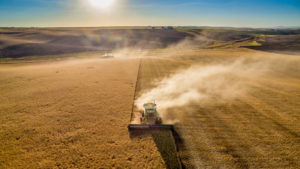Duxton Broadacre farms did it tough last year amid the worst dry spell in 116 years

Pic: Stevica Mrdja / EyeEm / EyeEm via Getty Images
Duxton Broadacre (ASX: DBF) is trying to build a profitable group of grain farming operations in south-eastern Australia.
And that’s a tough ask when there’s no rain. Here’s company chairman Ed Peter commenting on today’s half-year results:
“This season we have witnessed the lowest Autumn rainfall across South Eastern Australia since the 1902 Federation.”
The driest season in 116 years in what is already a low-rainfall region. Not surprisingly, it’s resulted in “below average winter cropping results which will impact short term performance” of the company.
Shares in Duxton were unchanged at $1.46 following the announcement, down from its 2018 listing price of $1.70.
Profit slump
Most of the company’s recent focus has been on drought mitigation strategies, including a cut-back on production for poor-performing grain and livestock assets,
It also reduced its forward sales to take advantage of higher wheat and grain prices driven by a shortage of supply.
The company has added another 700ha of crop irrigation and says its water supplies are secure for the next 18 months.
But when it came to the bottom line, the drought conditions took their toll; half-year results to the end of December showed a loss of $1.459 million, down from a $624k profit the previous year.
That pesky climate
“Ultimately drought is an unfortunate reality inherent in Australian agriculture, and we are enduring one of the most intense droughts on record,” Mr Peter said.
For investors, Australian agriculture stocks are one of the prime examples of companies whose fortunes are directly affected by changes in climate.
Last year, a review by industry regulator ASIC showed that not enough companies were doing enough to clearly communicate the risks posed by climate change on their business.
The disclosure of climate change risk hasn’t yet been specifically mandated by either ASIC or the ASX, but it looks set to remain an increasingly relevant issue – particularly for specific sectors.
- Subscribe to our daily newsletter
- Bookmark this link forsmall cap news
- Join our small cap Facebook group
- Follow us on Facebook or Twitter
UNLOCK INSIGHTS
Discover the untold stories of emerging ASX stocks.
Daily news and expert analysis, it's free to subscribe.
By proceeding, you confirm you understand that we handle personal information in accordance with our Privacy Policy.








